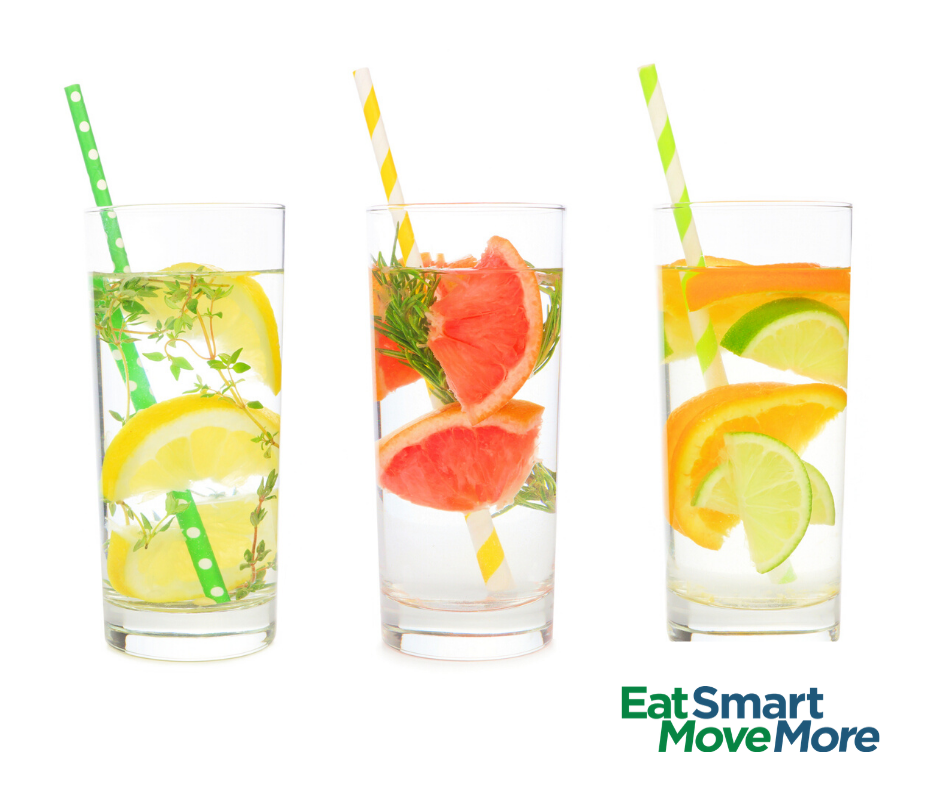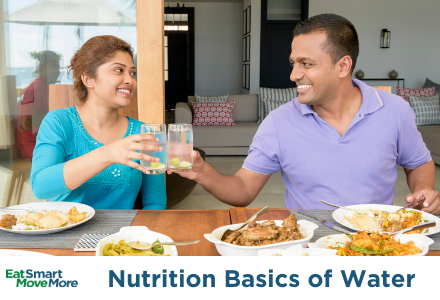In our previous post about the 6 Basic Nutrients, we gave a short description of the macronutrient water. Today, we’ll go into more detail about water, its functions in the body, and some information about different strategies to drink enough water.
Water Recommendations
Surprisingly, there are no recommendations for water in the Dietary Guidelines for Americans. There are some basic guidelines for “Adequate Intake” (AI) of water to replace the amount we lose in everyday functions (breathing, perspiration, and bathroom trips). For adult men, the AI is 15 ½ cups and for adult women, it’s 11 ½ cups. For kids, the AI is 5.5 cups for 1-3 year olds and up to 14 cups for teenage boys. Water is actually the basic nutrient we need the most, by weight and importance!
You can reach these recommendations from both fluids you drink as well as the food you eat. About 20% of your water needs come from food. The rest should be from no-added-sugar beverages, which means water as well as low-fat (1%) or skim milk, coffee, tea, and 100% juice.
Function of Water in Our Bodies
- Water makes up 50-65% of your body weight (more for young children, less for older adults). All of our body’s cells are filled with water-based fluids, even bone cells! Water is a solvent that other materials (nutrients, oxygen, waste products) dissolve in to travel throughout the body.
- Water regulates our body temperature, keeping us near 98.6°F no matter what the temperature is around us. Water is a great insulator. Sweat (made mostly of water) evaporates to cool us off during physical activity or hot weather.
- Water keeps our tissues moist, such as our eyes, nose, and mouth.
- Body fluids (blood, stomach “juice,” saliva, urine, amniotic fluid in the womb) are made of water. Water keeps stools soft to prevent constipation.
- Water lubricates joints and cushions organs and tissues for easy, comfortable motion.
- Water is an ingredient in metabolic processes that produce energy. That’s why we feel tired and lethargic when we get dehydrated.

Drinking Enough Water
- Reach for water first. Anytime you’re thirsty, choose water instead of other beverages. It’s refreshing, hydrating, and calorie free!
- Carry a reusable water bottle. You’ll always have a healthy beverage at hand. No need to buy a beverage or create trash from disposable bottles. Don’t forget to wash it often.
- Drink a glass (or two) before each meal. A Virginia Tech study found this can help with weight management, too!
- Add flavor, not sugar. Fruit infused water makes plain water taste great without added sugar. Kids will love this option. Unsweetened tea and coffee without added sugar or fat count toward your water needs, too.
- Choose sparkling water for a fizzy drink fix. If you love bubbles in your beverages, try a sparkling water. There are many options to choose from that don’t have added sugar or sweeteners.
Water is one of the six nutrients our bodies need. Water has many different important functions in our bodies. Do you have any questions about water, what it does in the body or how it fits into your diet?

